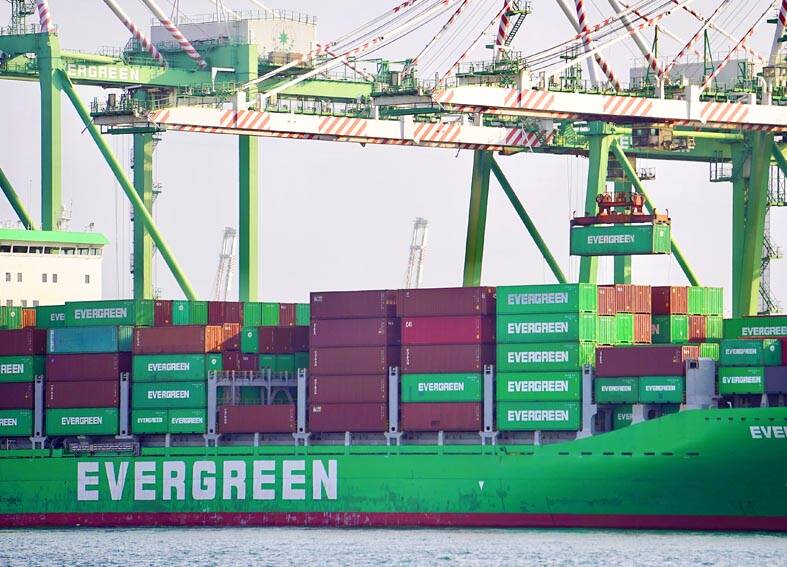Export orders last month expanded 4.8 percent year-on-year to US$50.03 billion, the greatest rise since November last year amid stronger-than-expected demand for artificial intelligence (AI) devices, high-performance computing (HPC) devices, such as servers, and inventory buildup ahead of new smartphone launches, the Ministry of Economic Affairs said yesterday.
Last month’s performance greatly exceeded the ministry’s high-end estimate of US$48.5 billion, or year-on-year growth of 1.6 percent from US$47.73 billion.
That bolstered the ministry’s confidence that export orders would expand in the second half of this year.

Photo: CNA
In the first seven months, export orders rose 2.7 percent year-on-year to US$324.89 billion.
“Last month’s performance surpassed our expectations due in part to strong demand for emerging technologies, mainly AI and HPC, which led to high demand for chips and other components,” Department of Statistics Director Huang Yu-ling (黃于玲) said via telephone. “With the arrival of the consumer electronics shopping season, customers’ inventory buildup demand also helped prop up orders.”
“Overall, we are seeing export orders move in a positive direction, with major segments swinging back to positive territory last month, except petrochemical products,” Huang said.
The ministry retained its forecast that export orders would grow sequentially each quarter during the third and fourth quarters, she said.
This month, export orders would be US$49.1 billion to US$51.1 billion, or annual growth of 6.7 percent to 11 percent, she said, attributing the uptick to AI and HPC demand.
“Taiwan is to benefit from the AI and HPC boom, as its semiconductor and server supply chains have a competitive edge over their global peers,” Huang said.
Export orders for information communication technology products last month grew 11 percent annually to US$14.13 billion, supported by robust demand for AI applications, cloud-based devices and servers, the ministry said.
Increased demand for notebook computers and graphic cards also helped, it said.
Orders for electronics rose 2.2 percent year-on-year to US$18.1 billion last month, primarily fueled by demand for AI-related applications and HPC devices, it said.
Inventory buildup at global smartphone vendors ahead of new model launches helped boost orders for chips and phones, it added.
Optoelectronics product orders expanded 7.8 percent year-on-year to US$1.78 billion last month, due mainly to increases in demand for camera lens modules and optronic inspection tools primarily from the US and the Southeast Asian countries, the ministry said.
Orders for basic metals rose 4.8 percent from a year earlier to US$2.17 billion last month, attributable to higher demand for metal products, it said.
However, the growth was offset by a decline in steel rolls and steel plates, it added.
Machine tools orders jumped 13.4 percent to US$1.67 billion last month, benefiting from semiconductor companies’ aggressive capacity expansion, resulting in higher demand for manufacturing equipment and automation systems, the ministry said.
Plastics product orders increased by 4.1 percent annually to US$1.65 billion on higher average selling prices and rising inventory restocking demand, the ministry said.
Petrochemical products orders last month shrank 0.6 percent to US$1.47 billion compared with July last year, the only segment that declined, it said, adding that the drop was due to overcapacity.
Increases in global crude oil prices helped absorb some order reductions, it said.

Taiwan’s rapidly aging population is fueling a sharp increase in homes occupied solely by elderly people, a trend that is reshaping the nation’s housing market and social fabric, real-estate brokers said yesterday. About 850,000 residences were occupied by elderly people in the first quarter, including 655,000 that housed only one resident, the Ministry of the Interior said. The figures have nearly doubled from a decade earlier, Great Home Realty Co (大家房屋) said, as people aged 65 and older now make up 20.8 percent of the population. “The so-called silver tsunami represents more than just a demographic shift — it could fundamentally redefine the

The US government on Wednesday sanctioned more than two dozen companies in China, Turkey and the United Arab Emirates, including offshoots of a US chip firm, accusing the businesses of providing illicit support to Iran’s military or proxies. The US Department of Commerce included two subsidiaries of US-based chip distributor Arrow Electronics Inc (艾睿電子) on its so-called entity list published on the federal register for facilitating purchases by Iran’s proxies of US tech. Arrow spokesman John Hourigan said that the subsidiaries have been operating in full compliance with US export control regulations and his company is discussing with the US Bureau of

Businesses across the global semiconductor supply chain are bracing themselves for disruptions from an escalating trade war, after China imposed curbs on rare earth mineral exports and the US responded with additional tariffs and restrictions on software sales to the Asian nation. China’s restrictions, the most targeted move yet to limit supplies of rare earth materials, represent the first major attempt by Beijing to exercise long-arm jurisdiction over foreign companies to target the semiconductor industry, threatening to stall the chips powering the artificial intelligence (AI) boom. They prompted US President Donald Trump on Friday to announce that he would impose an additional

Pegatron Corp (和碩), a key assembler of Apple Inc’s iPhones, on Thursday reported a 12.3 percent year-on-year decline in revenue for last quarter to NT$257.86 billion (US$8.44 billion), but it expects revenue to improve in the second half on traditional holiday demand. The fourth quarter is usually the peak season for its communications products, a company official said on condition of anonymity. As Apple released its new iPhone 17 series early last month, sales in the communications segment rose sequentially last month, the official said. Shipments to Apple have been stable and in line with earlier expectations, they said. Pegatron shipped 2.4 million notebook